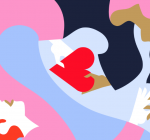Five Types of Non-fiction that Even Fiction Lovers Will Enjoy!
- March 27, 2025
- Publishing
This is a guest post by Roshni
While there are many fiction and nonfiction readers in the world, a certain animosity exists between those who exclusively read one and not the other. Nonfiction readers often look down on fiction, claiming that only serious reading is actual reading. As a result, many fiction readers feel a sense of insecurity and defensiveness about not reading nonfiction.

I don’t subscribe to the idea that only nonfiction books are educational. As Jennifer Powell tweeted,
“Nonfiction = learning through information; Fiction = learning through imagination.”
However, I do believe that fiction lovers are often apprehensive of nonfiction due to misconceptions, especially that nonfiction is:
- Boring
- Difficult
- Impractical
Let’s rectify these misconceptions, shall we? Here are five great nonfiction genres that you could try out as a beginner. (Note that I said “genres”. Many people dismiss nonfiction as “self-help,” but there is so much more this category has to offer!)
I. Anecdotal or Essay Non-fiction
These books explore stories of human resilience, share heartwarming anecdotes, offer reassurance that we aren’t alone in our problems, or simply compile humorous real-life situations. Often written in an accessible style by non-professional writers, they are easier for beginner nonfiction readers to enjoy.
You could begin with:
Any book from the “Chicken Soup for the Soul” series by Jack Canfield
Love Stories by Trent Dalton
Brown Women Have Everything by Sayantani Dasgupta
What We Remember Will Be Saved: A Story of Refugees and the Things They Carry by Stephanie Saldaña
II. True-Life Narratives
Books in this category include:
- Autobiographies: An account of a person’s life written by themselves
- Memoirs: Selected reminiscences, focusing on particular events or themes
- Biographies: An account of someone’s life written by someone else
While biographies may vary in quality depending on the author, autobiographies and memoirs are often excellent choices. Start with books written by celebrities or achievers you admire or in fields you’re passionate about.
You could begin with:
Show Business Personalities:
Born a Crime by Trevor Noah
Shah Rukh Khan: Legend, Icon, Star by Mohar Basu
Sports Icons:
Open by Andre Agassi
Unbreakable by Mary Kom
Faster than Lightning: My Story by Usain Bolt
Commoner Memoirs:
Somebody I Used to Know by Wendy Mitchell
The Reluctant Doctor: Stilettos to Stethoscope by Balesh Jindal
The Thin Blue-Yellow Line Between Love and Hate by Anton Eine
III. Topic/Subject-Based Nonfiction
Expository nonfiction, which explains specific topics or events, is often underrated. Many fiction lovers assume these books are too intense, but choosing a subject you’re passionate about can change that perception.
You could begin with:
Stiff: The Curious Lives of Human Cadavers by Mary Roach (Science)
Freakonomics by Stephen J. Dubner and Steven Levitt (Economics)
Andaza by Sumayya Usmani (Cookery)
Quiet: The Power of Introverts in a World That Can’t Stop Talking by Susan Cain (Mind & Body)
The Only Plane in the Sky: An Oral History of 9/11 by Garrett M. Graff (History)
IV. Investigative Nonfiction
This genre can be as thrilling as a twisty novel when written well. While many investigative books focus on negative events, others explore positive developments, offering hope and insight.
You could begin with:
Humankind: A Hopeful History by Rutger Bregman
Bottle of Lies: The Inside Story of the Generic Drug Boom by Katherine Eban
Bad Blood: Secrets and Lies in a Silicon Valley Startup by John Carreyrou
Factfulness: Ten Reasons We’re Wrong About the World – and Why Things Are Better Than You Think by Hans Rosling
Caste: The Origins of Our Discontents by Isabel Wilkerson
V. Nonfiction Graphic Novels
While not strictly a genre, graphic novels are an excellent format for exploring nonfiction. They range from memoirs and expository topics to quote collections and reflective pieces. The illustrations make complex concepts easier to visualize and understand.
You could begin with:
The Complete Persepolis and Embroideries by Marjane Satrapi
Down to the Bone by Catherine Pioli
Sapiens: A Graphic History by Yuval Noah Harari *(An illustrated adaptation of Sapiens)
Fine: A Comic About Gender by Rhea Ewing
Quiet Girl in a Noisy World by Debbie Tung

Finally…
The key to enjoying nonfiction is to find a topic or theme you relish. Don’t pick up a book simply because it’s popular. Choose what speaks to your heart rather than forcing yourself to like something just for the sake of it.
If, after trying the above genres, you still don’t enjoy nonfiction, that’s completely fine. There are more than enough books to read in a lifetime. Why struggle with something you don’t enjoy? After all, a reader is a reader, no matter what they read. Just continue to enjoy fiction without guilt.
Can nonfiction readers who are wary of fiction also try certain fictional genres for greater satisfaction? Indeed they can, but that’s a topic for another post.







